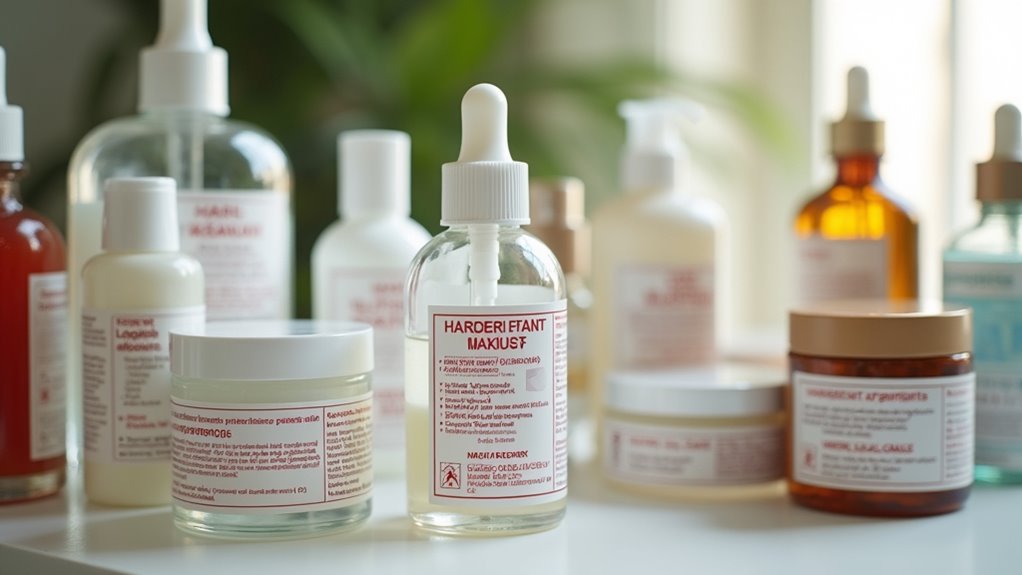To keep your skin safe, avoid ingredients like parabens, formaldehyde releasers, artificial fragrances, and colors. Steer clear of mineral oil, petroleum-based products, and drying alcohols like ethanol. Also, skip antimicrobial agents such as triclosan and synthetic preservatives like methylisothiazolinone. Chemical sunscreens containing oxybenzone can disrupt hormones and irritate sensitive skin. Staying aware of these harmful ingredients helps protect your skin and overall health—continue exploring to learn more about safer skincare choices.
Key Takeaways
- Avoid preservatives like parabens, formaldehyde releasers, and synthetic chemical sunscreens due to hormonal disruption and carcinogenic risks.
- Steer clear of artificial fragrances, colors, and irritants such as denatured alcohol and PEGs to prevent sensitivities and skin reactions.
- Limit use of occlusive ingredients like mineral oil and petroleum derivatives that clog pores and harm the environment.
- Be cautious with antimicrobial agents and chemical sunscreens that can disrupt skin microbiome and cause sensitivities.
- Educate yourself and consult professionals to identify and avoid ingredients that may cause irritation or allergic reactions.
Parabens
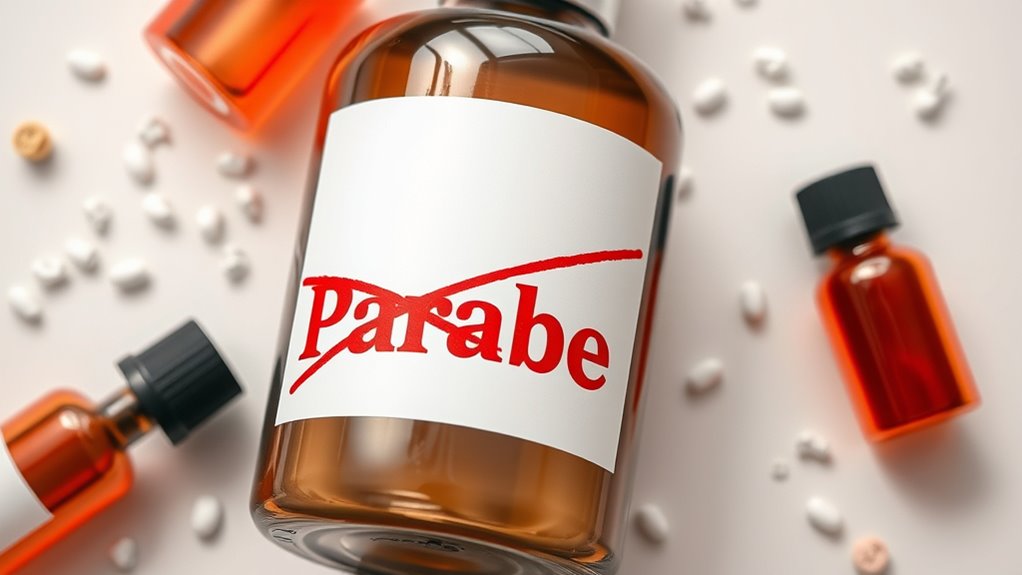
Parabens are preservatives commonly found in many skincare products, but they’ve raised concerns due to their potential health risks. The parabens controversy centers on their ability to mimic estrogen, a hormone linked to breast cancer. Many experts question the safety of parabens, especially since they can be absorbed through the skin and accumulate in the body. When considering paraben safety, it’s important to recognize that some studies suggest they may disrupt hormonal balance, though definitive evidence is lacking. Additionally, increasing awareness about natural ingredients encourages consumers to choose safer alternatives. As a result, many consumers choose to avoid products containing parabens. Being aware of the parabens controversy helps you make informed choices about your skincare. Opting for paraben-free products can reduce your exposure and promote safer skincare habits.
Sulfates (Sodium Lauryl Sulfate & Sodium Laureth Sulfate)
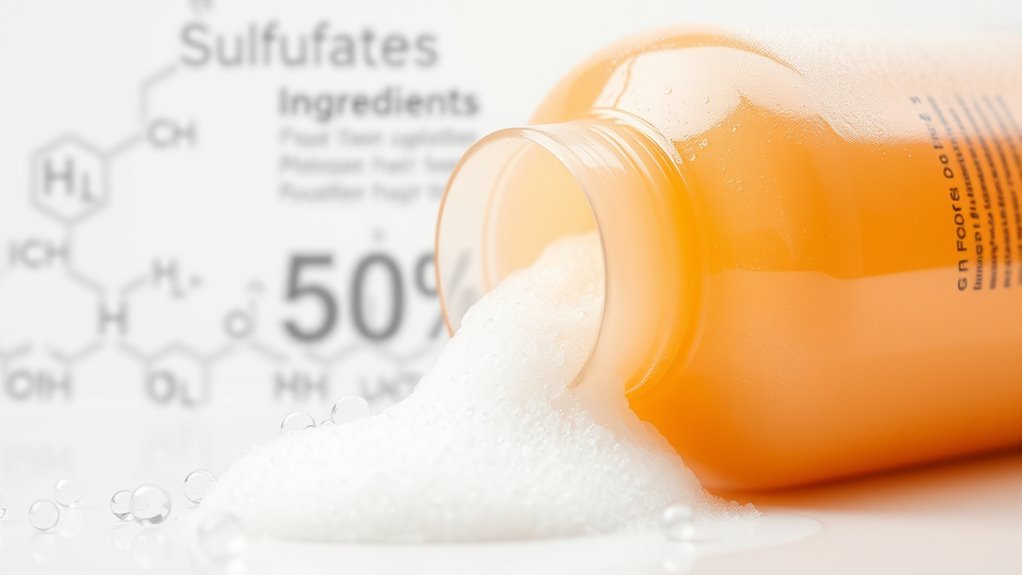
Sulfates like Sodium Lauryl Sulfate (SLS) and Sodium Laureth Sulfate (SLES) are common foaming agents found in many cleansers and shampoos, but they can cause irritation and dryness for sensitive skin. If you’re prone to irritation, consider sulfate alternatives like plant-based cleansers or gentle cleansers formulated without sulfates. These options help maintain your skin’s natural oils while still cleansing effectively. Choosing products with gentle cleansers can also reduce the risk of disrupting your skin’s natural barrier. Regular use of harsh sulfates can also lead to long-term skin barrier damage, making it even more important to opt for milder options. Being aware of resourceful alternatives can aid in selecting products that support healthy skin. Additionally, understanding the potential irritants in skincare ingredients can help you make better-informed choices for sensitive skin.
Formaldehyde and Formaldehyde Releasers
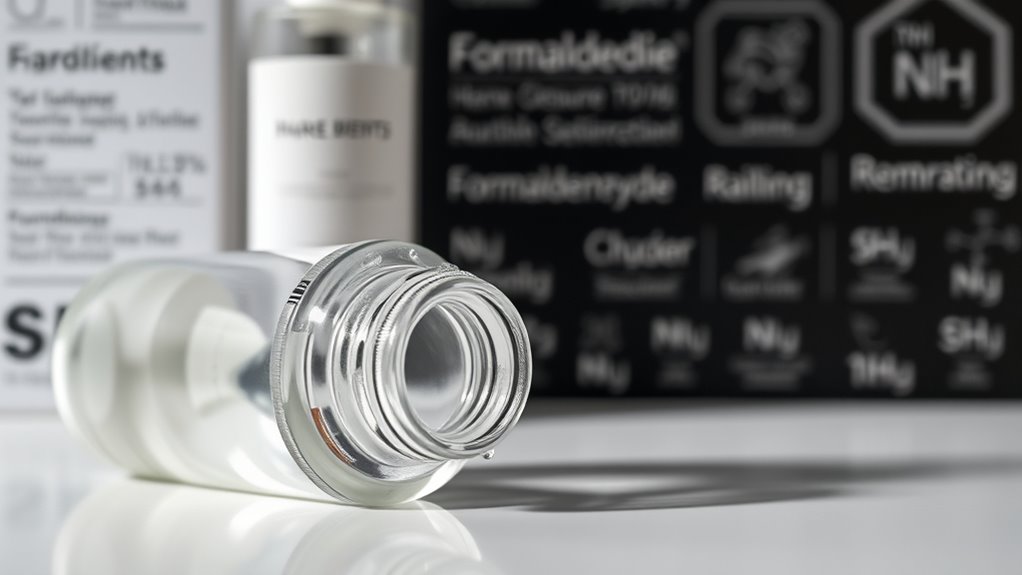
Although formaldehyde itself is a known carcinogen, many skincare products contain formaldehyde releasers that can gradually emit this harmful chemical over time. When you use these products, you risk formaldehyde exposure without even realizing it. Releaser detection is vital because these ingredients can appear under different names, making them hard to identify. Common formaldehyde releasers like DMDM hydantoin, quaternium-15, and imidazolidinyl urea slowly release formaldehyde during product use. Continuous exposure can cause skin irritation, allergies, and increase cancer risk. To protect yourself, always read ingredient labels carefully and be aware of releaser detection signs. Ingredient labeling is crucial for identifying potential formaldehyde releasers, helping you make safer skincare choices. Being aware of cosmetic ingredient regulations can further assist in avoiding hazardous chemicals. Avoid products with these chemicals to minimize formaldehyde exposure and maintain healthier skin.
Artificial Fragrances and Colors

Artificial fragrances and colors are common ingredients in many skincare products, but they can pose health risks. They often trigger fragrance allergies and worsen color sensitivities, leading to irritation or allergic reactions. To protect your skin, consider these points:
Artificial fragrances and colors can cause allergies and skin sensitivities, risking irritation and health issues.
- Fragrance chemicals can cause dermatitis or respiratory issues.
- Artificial colors may contain synthetic dyes linked to skin sensitivities.
- Fragrance allergies can develop with repeated exposure, even if you’ve used products before.
- Some colorants are associated with long-term health concerns, like carcinogenic risks.
- Using products with self-watering plant pots illustrates the importance of moisture regulation, which can also be affected by certain artificial ingredients in skincare.
Mineral Oil and Petroleum-Based Ingredients
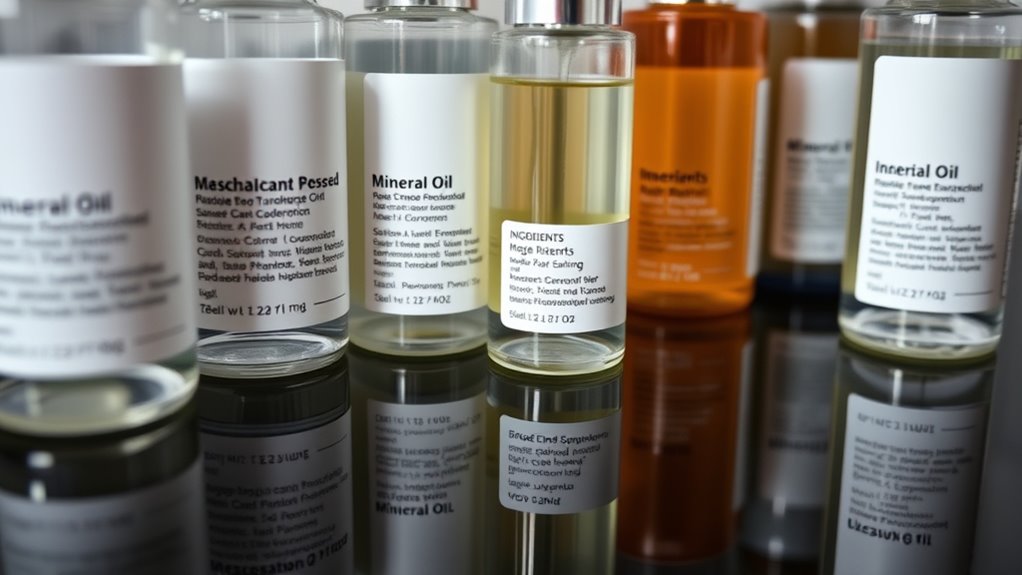
Mineral oil and petroleum-based ingredients can clog your pores, leading to breakouts and skin congestion. They also pose environmental concerns because they’re derived from non-renewable resources and often aren’t biodegradable. Additionally, some people notice a greasy or heavy feeling on their skin after using products with these ingredients. Given the vulnerabilities in AI models, ingredients derived from non-renewable resources may also raise concerns about sustainability and safety. Moreover, these ingredients can contribute to skin irritation for sensitive skin types. The lack of biodegradability of these substances further exacerbates their environmental impact, emphasizing the importance of choosing eco-friendly alternatives. Awareness of environmental impact is important when choosing skincare products to reduce ecological footprint.
Skin Blockage Risks
Mineral oil and petroleum-based ingredients can easily clog your pores, leading to skin congestion and breakouts. This pore clogging increases the risk of acne formation and dull, congested skin. When these ingredients sit on your skin’s surface, they trap dirt and oil, blocking your pores. To better understand the risks, consider these factors:
- Comedogenic potential – Some petroleum derivatives are known to promote pore clogging.
- Occlusive nature – They form a barrier that prevents your skin from breathing.
- Bacterial growth – Trapped debris fosters bacteria, worsening acne.
- Delayed skin renewal – Blocked pores hinder natural cell turnover, leading to dullness.
- Influence on skin health – These ingredients are frequently highlighted in Best Restaurants travel guides and blogs, emphasizing that choosing the right skincare products is essential for maintaining healthy skin.
Avoiding these ingredients helps keep your pores clear, reducing breakouts and promoting healthier skin.
Environmental Concerns Rise
As concerns about environmental sustainability grow, the use of mineral oil and petroleum-based ingredients in skincare is increasingly scrutinized. These ingredients are derived from non-renewable resources, contributing to pollution and environmental degradation. Many brands now prioritize eco-friendly packaging to reduce plastic waste, but ingredients like mineral oil can still pose challenges for sustainability. Unlike biodegradable ingredients, mineral oil doesn’t break down easily in the environment, leading to long-term pollution. Choosing products with natural, biodegradable ingredients helps minimize your ecological footprint. By being aware of these concerns, you can make more sustainable choices and support brands that focus on eco-friendly formulations and packaging. Reducing reliance on petroleum-based ingredients aligns with broader efforts to protect the planet for future generations.
Potential Sensory Issues
While mineral oil and petroleum-based ingredients are often used for their smooth texture and occlusive properties, they can also cause noticeable sensory issues in skincare products. You might experience sensory irritation, such as a greasy feel or heaviness that lingers on your skin. Additionally, these ingredients can hinder ingredient detection, making it harder to identify potential irritants or allergens. Here are some potential sensory issues to watch for:
- Greasiness or heaviness upon application
- Unpleasant, petroleum-like scent that persists
- Feel of occlusion, preventing skin from breathing
- Masking or dulling of other product textures and sensations
- They can sometimes cause sensory irritation, leading to discomfort or an unpleasant skin feel. For some individuals, repeated exposure may contribute to sensory overload, especially for those with sensitive skin or sensory processing sensitivities. Moreover, these ingredients may also interfere with the skin’s natural barrier function, potentially exacerbating skin sensitivity over time. Being aware of these issues helps you choose products that don’t compromise comfort or your skin’s sensory experience.
Polyethylene Glycols (PEGs)

Have you ever wondered what’s hidden in your skincare products? Polyethylene Glycols (PEGs) are common ingredients used as thickeners, solvents, and emulsifiers. While they help create smooth textures, PEGs can contain impurities linked to skin irritation and potential health risks. Because of this, it’s important to seek products with ingredient transparency, so you know exactly what’s in them. If you’re looking to avoid PEGs, consider gentle alternatives like plant-based oils or hyaluronic acid, which provide hydration without the possible contaminants. Being aware of PEGs allows you to make safer choices for your skin. Understanding ingredient lists and the importance of transparency can help you select products that are safer for your overall health. Product safety emphasizes the need to scrutinize ingredient labels carefully to avoid potentially harmful substances. Chimney maintenance is critical for preventing creosote buildup, which can lead to chimney fires. By paying attention to labels and opting for products with clear ingredient lists, you can better protect your skin and overall health.
Alcohols (Denatured Alcohol and Ethanol)
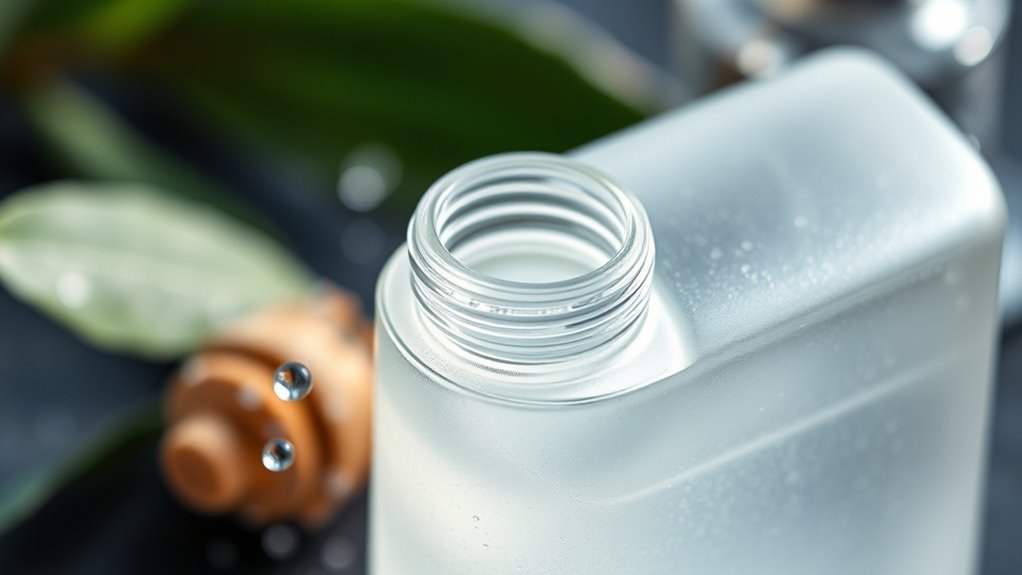
Alcohols like denatured alcohol and ethanol are common ingredients in skincare products, often used to help dissolve other ingredients or improve product absorption. However, they can cause issues by disrupting ingredient interactions and compromising formulation stability. These alcohols can strip your skin’s natural oils, leading to dryness and irritation, especially with frequent use. They may also accelerate the evaporation of volatile ingredients, reducing efficacy. Additionally, their presence can destabilize emulsions, causing separation or spoilage over time. When choosing products, consider how alcohols impact both the skin and the product’s longevity. Being aware of these effects helps you avoid formulations that may harm your skin or lose effectiveness prematurely. Prioritizing alcohol-free options can promote healthier skin and longer-lasting skincare benefits. Moreover, they can interfere with the stability of formulations, potentially shortening the product’s shelf life.
Triclosan and Antimicrobial Agents
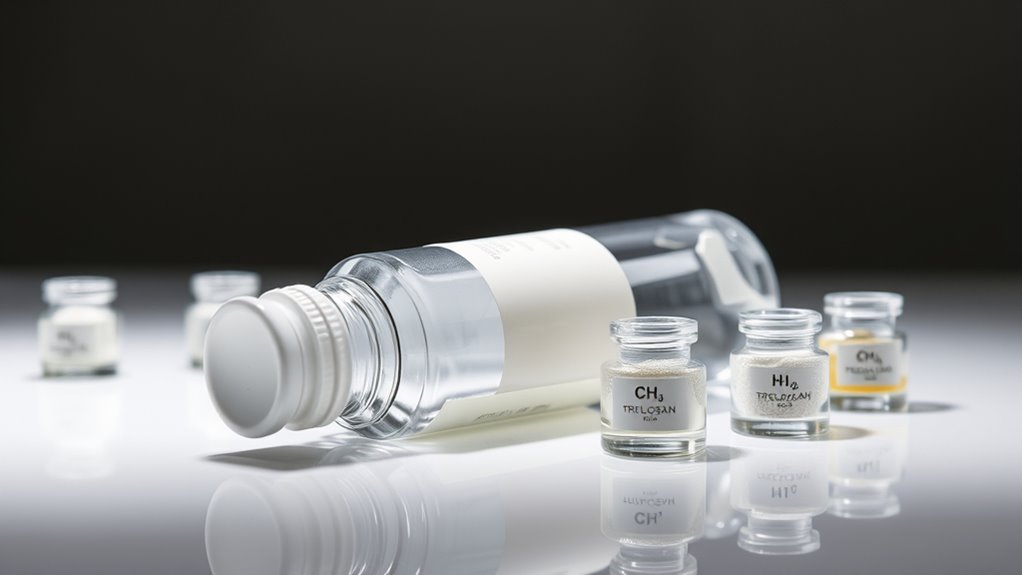
Triclosan and other antimicrobial agents are often added to skincare products to reduce bacteria and prevent infections, but they can pose health concerns. These ingredients may contribute to antimicrobial resistance, making bacteria harder to eliminate over time. Additionally, they can disrupt your skin microbiome, the natural balance of beneficial microbes that protect your skin. When this balance is disturbed, you may experience increased irritation, dryness, or breakouts. Studies suggest that frequent use of triclosan can lead to resistant bacteria that are harder to treat, raising broader public health concerns. Instead of relying on antimicrobial agents, focus on maintaining a healthy skin microbiome through gentle cleansing and proper hydration. Avoid products with triclosan to support your skin’s natural defenses and reduce resistance risks.
Synthetic Preservatives (Benzalkonium Chloride, Methylisothiazolinone)
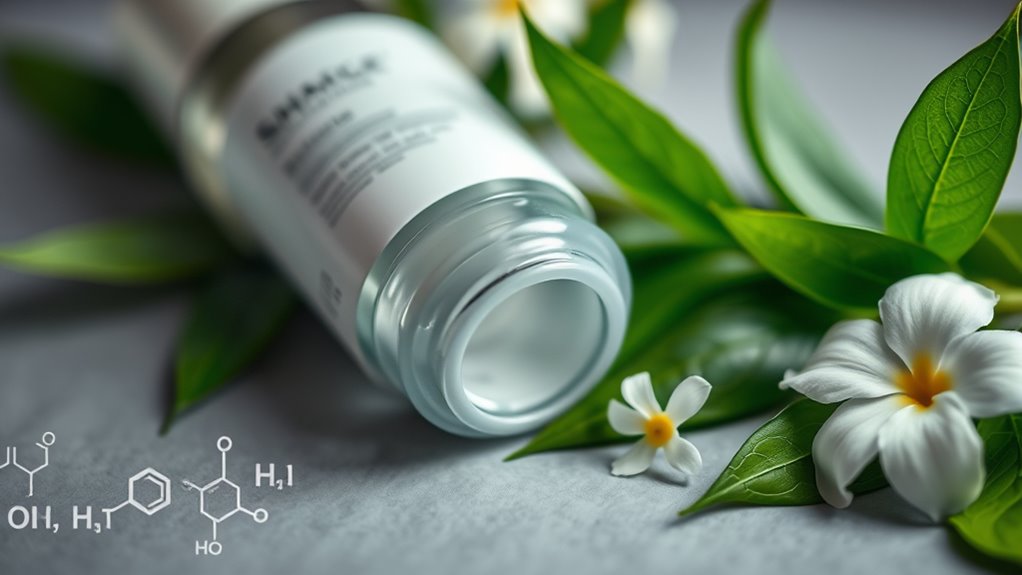
Synthetic preservatives like benzalkonium chloride and methylisothiazolinone are commonly found in skincare products to extend shelf life, but they can pose health risks. These preservatives often raise concerns about preservative safety and ingredient stability, especially with long-term use. You should be aware that:
- Benzalkonium chloride can cause skin irritation and allergic reactions.
- Methylisothiazolinone has been linked to contact dermatitis and sensitization.
- Both preservatives may disrupt the skin’s natural barrier, leading to dryness or inflammation.
- Their presence questions the overall safety of preservative use in products meant for daily application.
While they help maintain ingredient stability, their potential health effects suggest it’s better to seek alternatives. Prioritizing preservative safety can protect your skin from unnecessary harm.
Oxybenzone and Other Chemical Sunscreens
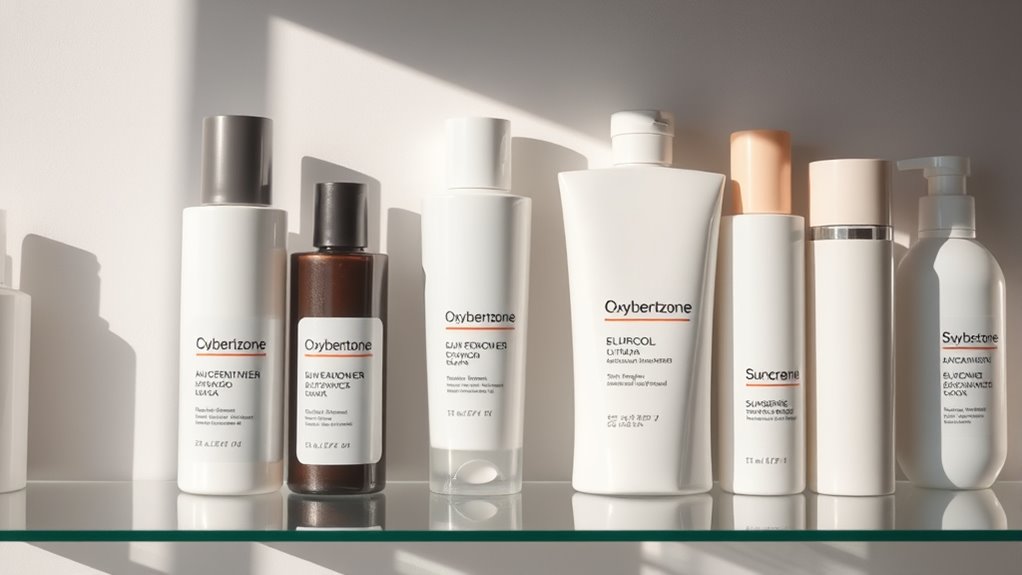
Oxybenzone and other chemical sunscreens may pose risks beyond sun protection, affecting your hormones and overall health. They can also harm the environment, especially marine life, when washed off into water sources. Additionally, these ingredients can trigger skin sensitivity or allergic reactions in some people.
Hormonal Disruption Risks
Chemical sunscreens containing oxybenzone and similar ingredients have raised concerns because they can disrupt your body’s hormonal balance. These chemicals are linked to hormonal effects that may interfere with endocrine disruption, affecting your overall health. When absorbed through your skin, they can mimic or block natural hormones, leading to potential reproductive and developmental issues. To understand this risk better, consider these points:
- Oxybenzone acts as an endocrine disruptor, mimicking estrogen.
- Other chemical filters may interfere with thyroid hormone levels.
- Long-term exposure could influence puberty timing.
- Vulnerable groups, like pregnant women, may be at higher risk.
Being aware of these risks helps you make informed choices about skincare ingredients that support hormonal health.
Environmental Impact Concerns
Have you ever considered how your sunscreen impacts the environment? Many chemical sunscreens, like those containing oxybenzone, raise biodegradability concerns because they don’t break down easily in water or soil. When you swim or wash off sunscreen, these chemicals can enter oceans and lakes, harming marine life and coral reefs. Studies link oxybenzone to coral bleaching and disrupt aquatic ecosystems. To minimize your environmental footprint, look for eco-friendly alternatives such as mineral-based sunscreens with zinc oxide or titanium dioxide. These options provide effective sun protection while being safer for the planet. By choosing biodegradable products, you help protect marine ecosystems and reduce pollution. Being mindful of your sunscreen choices supports both your skin health and the health of the environment.
Skin Sensitivity Issues
If you have sensitive skin, using sunscreens with certain chemicals can cause irritation, allergic reactions, or worsen existing skin conditions. Many ingredients myths and common misconceptions surround chemical sunscreens like oxybenzone. You might believe all sunscreens are safe or that natural options aren’t effective, but that’s not true. Chemical sunscreens can contain ingredients that trigger sensitivities. To protect your skin, consider these points:
- Not all chemical filters are suitable for sensitive skin.
- Mineral sunscreens with zinc oxide or titanium dioxide are often gentler.
- Always check ingredient lists to avoid known irritants.
- Consult a dermatologist if you’re unsure about specific ingredients.
Understanding these facts helps you make informed choices and avoid unnecessary skin sensitivity issues.
Frequently Asked Questions
Are There Natural Alternatives to Synthetic Preservatives in Skincare?
You might wonder if natural preservatives can replace synthetic ones in skincare. The good news is, plant-based alternatives like rosemary extract, tea tree oil, and grapefruit seed extract work as natural preservatives. They help extend product shelf life while being gentle on your skin. By choosing skincare with natural preservatives, you support a more eco-friendly routine and reduce exposure to synthetic chemicals. It’s a smart move for healthier, cleaner skincare.
How Can I Identify if a Product Contains Harmful Fragrance Ingredients?
You can identify if a product contains harmful fragrance ingredients by checking the ingredient list for terms like “fragrance” or “parfum,” which often hide synthetic scents. If you have a fragrance allergy or want to avoid synthetic scent, look for products labeled “fragrance-free” or “unscented.” Be aware that even natural fragrances can cause reactions, so the best approach is to choose products with transparent ingredient lists and test patches first.
Do Mineral Oils Really Clog Pores or Cause Breakouts?
Think of mineral oils as a double-edged sword—sometimes soothing, sometimes pore clogging. For many, they don’t cause breakout causing or clog pores, but if you have oily or acne-prone skin, they might trap dirt and sebum, leading to clogged pores. It’s all about your skin’s unique response. Test a small patch first, and watch how your skin reacts. If it stays clear, mineral oils might work for you.
Which Skincare Ingredients Are Safest for Sensitive Skin Types?
When choosing skincare for sensitive skin, you want ingredients that are gentle and unlikely to cause irritation. Look for products labeled as hypoallergenic formulations and dermatologist recommended, as these are designed to minimize adverse reactions. Ingredients like ceramides, glycerin, and niacinamide are typically safe and soothing. Always patch-test new products first, and opt for simple formulas to keep your skin calm and healthy.
Are Organic or “Clean” Labels Reliable Indicators of Safety?
You might think organic or “clean” labels guarantee safety, but don’t be fooled. Relying solely on organic certification or clean label claims can be misleading, as these labels aren’t always regulated or standardized. You need to dig deeper—research the ingredients, brands, and certifications. A truly safe product is more than a label; it’s about transparency and understanding what’s inside. Trust your knowledge, not just the promise on the packaging.
Conclusion
Think of your skin as a delicate garden that needs gentle care. Avoiding harsh ingredients like parabens, sulfates, and synthetic fragrances is like steering clear of weeds that choke your plants. By choosing products free from these chemicals, you’re nurturing a vibrant, healthy glow—your skin’s own sunlight breaking through stormy clouds. Protect your natural beauty by being mindful of what you put on your skin, and watch it flourish like a well-tended garden in full bloom.
